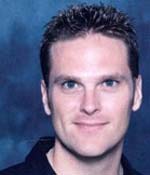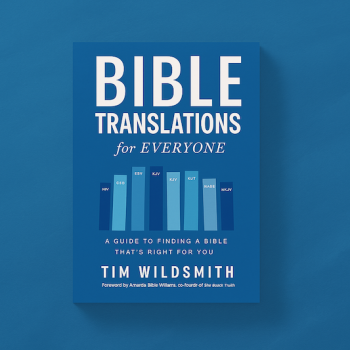 Kathleen Mulhern is Managing Editor of Patheos.com.
Kathleen Mulhern is Managing Editor of Patheos.com.
Albert Einstein was known to have contributed this bit of parenting advice: "If you want your children to be intelligent, read them fairy tales. If you want them to be more intelligent, read them more fairy tales." And, "When I examine myself and my methods of thought, I come to the conclusion that the gift of fantasy has meant more to me than any talent for abstract, positive thinking."
In my teaching and speaking, in my conversations with various Christian leaders and thinkers, I have come across what I can only describe as a weak religious imagination. We seem to have lost, in many circles, the ability to fantasize about the glories of heaven, the darkness of hell, the magical power of love, the possibilities of the Spirit reversing all things, and, most of all, the utterly immeasurable love of God who overcomes all obstacles to reach us in our cold isolation.
What Albert Einstein accomplished scientifically, he did in part because he could imagine a different reality than the one mandated for him by the scientific community as it was at the end of the 19th century. And that imagination came from an immersion in narrative, in vivid portrayals of the challenges of foul darkness, dragons, and treachery against the purity of courage and truth.
Yes, yes, fairy tales are pie-in-the-sky depictions of magic and mystery and, we're told, silliness. But when I weighed such follies against my children's high school literature reading list, I recognized that in a lot of our reading we have exchanged the madness of hope for a steady diet of the dark, despairing, "realistic" book, which is, we are told, more genuine, more honest, more authentic. I would argue that reading nothing but grim realism closes our minds to the possibilities of the impossible beyond the boundaries of "reality." And frankly, I believe the wildest fantasies we can come up with are closer to the "authentic" than the hopelessness we're fed in an awful lot of contemporary literature.
So, with all due respect to the weighty books of theology that demand to be read, I would most strongly suggest that every Christian baptize his or her imagination with fantasy and the grand narratives of hopefulness so that we can whet both our spiritual appetites and those of our children, friends, parishioners.
Start in the children's section of your local library and just choose half a dozen fairy tale books. They really don't have to be Christian. The tales of the Brothers Grimm are a good place to start -- 200+ of them should carry you through much of the summer. Move on, if you have neglected them, to the Christian classics: The Narnia Chronicles, The Lord of the Rings, The Silmarillion, Lilith, Descent into Hell, The Princess and the Goblin, A Wrinkle in Time. Read King Arthur fantasies: T.H. White's, Stephen Lawhead's, Bernard Cornwell's.
Try some of the master works of past centuries that have illuminated the thinking and, yes, even theology, of so many great writers. We remember that C. S. Lewis wrote about George MacDonald's fantasy: "Now Phantastes . . . had about it a sort of cool, morning innocence . . . What it actually did to me was to convert . . . my imagination." And elsewhere: "I saw the bright shadow coming out of the book into the real world and resting there, transforming all common things and yet itself unchanged. Or, more accurately, I saw the common things drawn into the bright shadow." Lewis' imagination fired his powerful thinking and writing and generated his compelling descriptions -- fictional and non-fictional -- of Christian life and grace.
This is just a beginning -- tell me your favorites. There are so many more, and I'm looking for some more good reading suggestions.
And finally, though this may not seem to fit the list, include Augustine's Confessions, the author's journey through the memories of a lifetime and a reimagination of his own story, baptizing it in light of the larger metanarrative of God's work in creation, redemption, and the culmination of all things in the love of Christ. For this is our work, to retell our own story as the story of God's work, the work of resurrection that is shaped like me. And how can we do it, if all we have in our minds is propositional truth and abstract doctrines, embedded in the pain of a closed universe?
 C. Michael Patton is President of Reclaiming the Mind Ministries, developer of The Theology Program for lay and pastoral theological education, and proprietor of Parchment and Pen.
C. Michael Patton is President of Reclaiming the Mind Ministries, developer of The Theology Program for lay and pastoral theological education, and proprietor of Parchment and Pen.
There are times in our lives when certain things come at just the right moment. Articles I have read, sermons I have listened to, and rebukes from a friend all qualify. When it comes to books I have read, one that stands out more than any other as influencing me in a defining way: Grace Awakening by Chuck Swindoll.
It was in the mid-nineties when I first read it. I was on the fence of legalism. Desiring to become a more committed Christian, I was ready to take up the banner of a thousand dos-and-don'ts and then enforce them on whoever would listen. This book introduced me to a concept that is, I believe, the most radical and foreign concept to the human intuition. It was to me. I had, of course, heard about grace. I knew in theory that I needed it. But I did not know just how radical (and there is simply no better word for it) God's grace really was. And Swindoll taught me that grace is not simply something that God gives to us, but we must give to others as well.
Legalism gives lists, top-tens, laws, and rules to live by for acceptance. Grace works outside of those lists or it does not work at all. Chuck made grace real for me. He challenged me to extend this grace to other people. How hard is that? Grace is easy to receive, but much more difficult to give away. When I felt like I was being gracious by modifying and shortening my list, he showed me that true grace "stoops" and burns all lists.
Grace is not cheap and it is not trivial. Believers must understand their debt, helplessness, hopelessness, brokenness, and insufficiency before grace can ever be understood. When I listened to Chuck speak on grace back in 1993, and read the book a short time later, I understood well my debt. I knew that an "IOU" would not do. Our only hope, as Swindoll puts it, lies in "God's favor to the ill-deserving."
Ironically, this message of grace did not give me a credit card. I suppose that I could have thought of it as such, but its radicalness -- its "you have got to be kidding me" radicalness -- resulted in my allegiance. An imperfect allegiance, yes. But one that I had yet to find until reading this work.
In my opinion, this work is a masterpiece that should be read by all Christians. Swindoll is the golden tongue of this age. His legacy will be one that is shaped by his preaching, his commitment to Scripture, and his unyielding call for people to recognize God's majesty and sovereignty. But most of all, for me, he opened my eyes to grace-he caused me to have my own Grace Awakening. Chuck's book came just in the nick of time.
See the same questions discussed at the Mainline Protestant Portal. And for more articles like this, see the Evangelical Portal.




